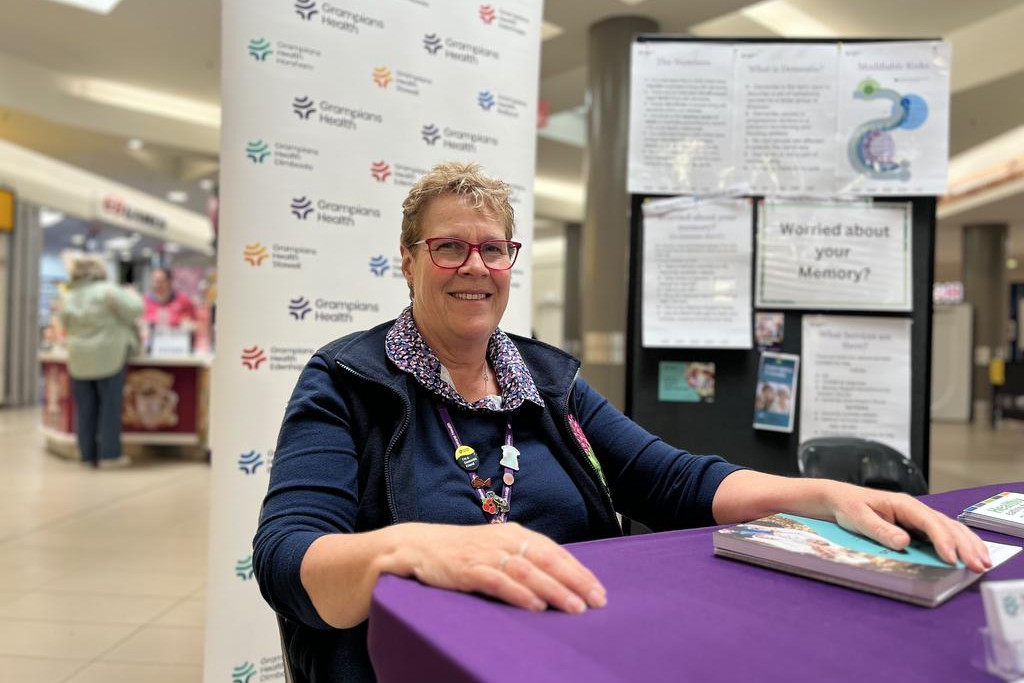General News
10 November, 2025
Dementia care focus grows across Wimmera
As more families across the Wimmera experience the realities of dementia, local health services are stepping up to provide not only care, but also understanding, reassurance and connection.

While awareness about dementia has grown, health workers say there is still confusion about what it is, how it can be diagnosed, and what support exists in small rural communities.
Major health groups, including Rural NorthWest Health (RNH) and Grampians Health, are two key providers working across the region to help people live well with dementia, both at home and in residential care settings.
Their shared message is one of early diagnosis, practical support and community education.
RNH Wellbeing Coordinator Katrina Fallon said RNH provides dementia-related care to people living in the northern part of Yarriambiack Shire, while sharing services in the southern area with Dunmunkle Health Services.
“At our Warracknabeal campus, we have a wing of the residential aged care facility, Wattle Crescent,” Ms Fallon said.
“The foundation of care provided in Wattle Crescent is the provision of memory support.
“Staff aim to help residents engage in activities that serve a meaningful purpose to them, focusing on their capabilities and interests.”
She said the same person-centred philosophy applies at RNH’s Hopetoun campus, even though it does not have a separate dementia-specific area.
“While our Hopetoun campus does not have a specific area for residents living with dementia, they too follow the same practice of focusing on capabilities and interests,” Ms Fallon said.
“Our RNH Facebook page often displays photos of the many activities the Hopetoun residents participate in."
RNH previously had a dedicated memory support nurse, a role the organisation hopes to restore.
“We are hoping to reestablish this and are happy for community members either living with dementia themselves or their loved ones to contact us for assistance,” Ms Fallon said.
Wellbeing coordinators can also offer practical support at home, particularly for individuals who are still managing independently.
“We can provide visual aids such as memory prompts and way-finders,” she said.
“It can be provided within the home or prompts to remember tasks such as medication timing, appointment reminders, schedule prompts, day/night orientation, et cetera.”
She said RNH is also exploring the idea of restarting a support group for people living with dementia and their carers.
“We are also hoping to reestablish a support group for people living with dementia and are interested in seeking feedback, if this is a viable option,” Ms Fallon said.
Across the region, Grampians Health Horsham’s memory support nurse, Cathy Ryan, sees a wide range of emotions and concerns from people attending information sessions and memory clinics.
“There’s been a variety of concerns,” she said.
“Some people are worried about their own memory loss, others just want to learn more about dementia, and some are looking for guidance on what services are available.”
Ms Ryan added many locals are surprised to discover how many people with dementia remain at home rather than in aged-care facilities.
“Around 85 per cent of people with dementia are still living in our community,” she said.
“They’re managing with support from carers or services and some don’t even realise they’re in the early stages.”
Early symptoms can be subtle but are essential to recognise.
“For the most common form, Alzheimer’s disease, the first signs are often short-term memory loss, misplacing things, or confusion about time and place,” Ms Ryan said.
“Someone might forget what day it is or have trouble finding their way home.”
She said stress and anxiety can sometimes mimic dementia symptoms, which is why a medical assessment is vital.
“Long-term stress can make memory worse and look like dementia,” she said.
“That’s why I always tell people to start by speaking to their GP, as some issues are treatable once identified.”
Grampians Health offers a monthly carer support group in Horsham, as well as a memory support service where Ms Ryan visits people in their homes.
“I go out, assess their particular needs, and help them stay at home as long as they want to,” she said.
“It might mean setting up routines, safety aids, or linking them to other services.”
Formal diagnosis is provided through Horsham’s Cognitive Dementia and Memory Service (CADAMS) clinic, which accepts referrals from GPs.
“Once someone has a diagnosis, they can get education through me, through Dementia Australia, or Dementia Support Australia if behavioural changes arise,” Ms Ryan said.
Her work takes her well beyond Horsham.
“My service area stretches from Hopetoun all the way to the South Australian border,” she said.
“If there’s a referral, I go where I’m needed.”
She said there are also dementia support groups in other towns in the region, which give locals a chance to share experiences close to home.
“People don’t always understand dementia,” Ms Ryan said.
“But the more awareness we have, the more inclusive and compassionate our communities become.
“There’s no cure yet, but there are ways to slow the impact and maintain quality of life.”